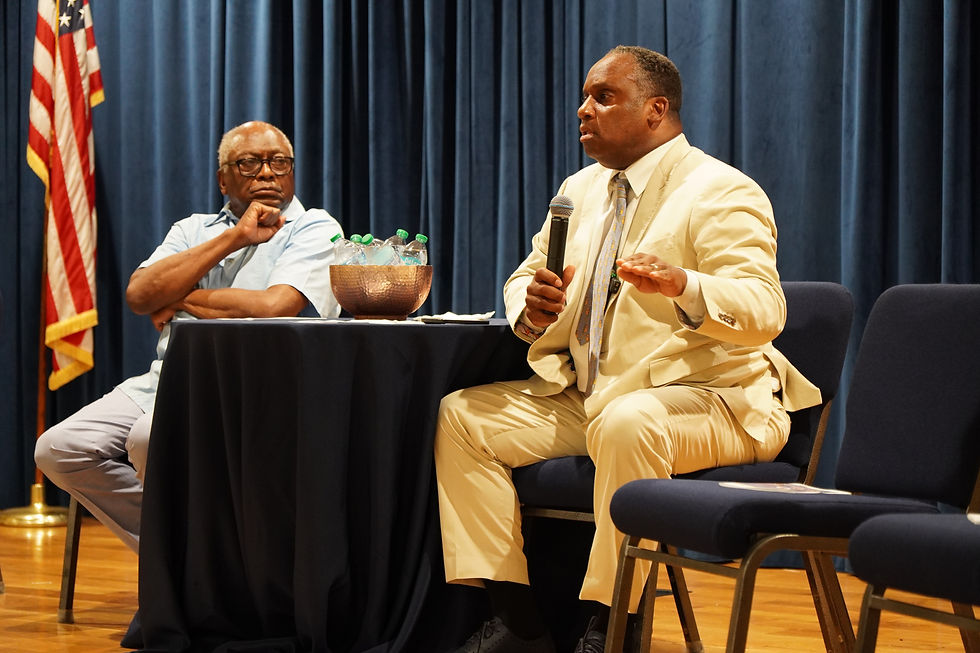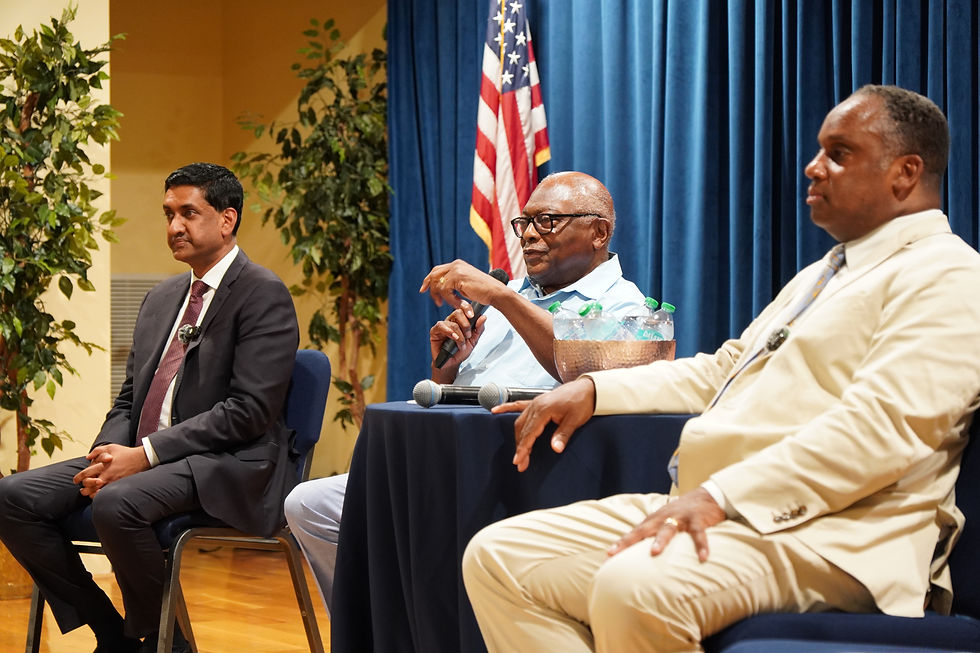Top Dems Sound the Alarm on Trump’s Economy: Future of EV Could Be Bankruptcy
- CUBNSC

- Jul 20, 2025
- 4 min read
By Javar Juarez | CUBNSC
COLUMBIA, S.C. — In a Sunday town hall hosted by the Columbia Branch of the NAACP at Trinity Baptist Church, three powerhouse Democrats—Congress-members Ro Khanna, Jonathan Jackson, and Majority Whip Emeritus James E. Clyburn—sounded a clear and coordinated alarm about the economic dangers posed by Donald Trump’s so-called “Big Beautiful Bill,” a legislative package critics now call the Big Ugly Bill.
Framing the moment as a fight for the soul of the working class and the future of multiracial democracy, the lawmakers condemned a sweeping agenda they say threatens Medicaid, electric vehicle manufacturing, affordable healthcare, and the legacy of civil rights.
“South Carolina is now at the crossroads of history and destiny,” said Congressman Jonathan Jackson, whose roots trace back to Greenville. “The veil of slavery is now over, but it lingers through policies, through prisons, through poverty. Jim Crow is still around. It’s dressed up in a new disguise, and it’s called disinvestment.”
“Where Are Your Senators?”

Jackson didn’t hold back when it came to Republican leaders in the state. “If you know where Senator Tim Scott is, tell him I’m looking for him. If you know where Lindsey Graham is, tell him I’m looking for him.”
The congressman criticized South Carolina’s lack of Medicaid expansion and slammed the Trump-backed legislation threatening deep cuts to programs like SNAP, ACA subsidies, and Medicaid itself.
“Six out of ten senior citizens in nursing homes are there because of Medicaid. What happens when you have to bring your mother, your father, your relatives back home?” Jackson asked. “Where is the money going to come from? The state budget has no reserves. This is a setup for failure.”
Jackson—who revealed he pays $900 a month for his own ACA coverage—urged attendees to understand that this crisis is not looming in the distant future.
“These cuts are happening now.”
Ro Khanna: Linking Civil Rights and Economic Justice

Representative Ro Khanna of California, one of the most tech-savvy and policy-forward members of Congress, drew a powerful connection between the civil rights movement and today’s fight for economic equity—warning that Trump’s economy threatens to reverse hard-won gains for marginalized communities.
“The freedom struggles that were started against colonialism and Jim Crow must now be married with economic empowerment,” Khanna said. Drawing on the legacies of Dr. Martin Luther King Jr. and Mahatma Gandhi, Khanna described how cross-racial coalitions and moral clarity could build a fairer, more equitable economy.
Khanna’s call to action was grounded in his experience with Silicon Valley’s immense wealth and the barriers that still keep Black and Brown entrepreneurs out of high-growth industries.
“My students at Stanford had funding before they had an idea, just because they had the right email address,” Khanna said. “All DEI is saying is we need to find talent and merit in places that have been excluded from networks of privilege.”
The California lawmaker praised HBCUs for opening doors for immigrants and entrepreneurs, highlighting how a shared legacy of struggle and resilience can serve as the foundation for an inclusive economy.
Clyburn: “Watch What They Do”

Congressman James E. Clyburn, South Carolina’s elder statesman, issued a sobering reminder rooted in scripture.
“It is by their deeds, not their words, that we shall know them,” Clyburn said, quoting from the book of Matthew. “You can’t get good out of evil.”
He reminded the audience to hold elected officials accountable not just for what they say, but for what they fail to do—particularly in times of economic pain and racial injustice. “Watch what they do, and govern yourselves accordingly.”
From Columbia to Greenville: A Statewide Mission
The town hall was part of a multi-city tour across South Carolina, with the three Congress-members traveling next to Greenville to meet with more of the state’s most vulnerable residents.
This visit came at a critical time, as Trump’s allies in Congress push forward legislation that would eliminate key EV tax incentives and unravel support systems that help millions stay afloat. For South Carolina—a state betting big on EV manufacturing and green jobs—this could spell economic disaster.
“EV companies could go bankrupt, costing South Carolina thousands of jobs,” Jackson warned. “We can’t afford to let that happen.”
Trump's Economy: A Civil Rights Crisis in Disguise

This wasn’t just a policy talk—it was a call to arms. The message was clear: Trump’s economic agenda is not just bad policy; it’s a direct threat to the gains made since the Civil Rights era. And unless voters organize, mobilize, and demand more from their leaders—especially those who refuse to show up—South Carolina could be dragged backward into an era of deeper inequality and missed opportunity.
“This is the greatest America has ever been,” Jackson said. “We don’t have to go to separate bathrooms or graveyards—but this administration is determined to turn back the hands of time.”
Related Reads:
Subscribe to CUBNSC for More Community News and Exclusive Coverage.



Comments